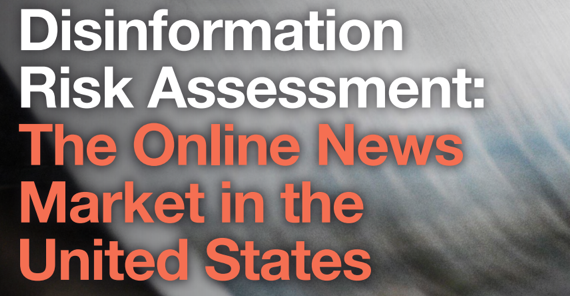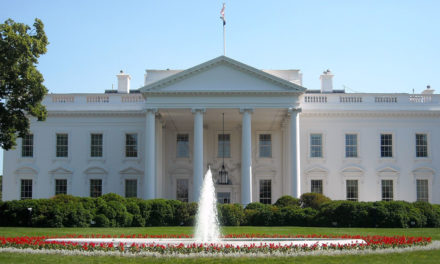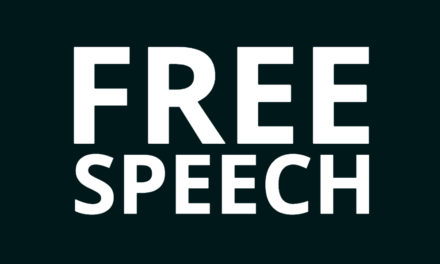The Global Disinformation Index (GDI) published a list of the “10 Lowest Risk Online News Outlets” for disinformation, which included mainstream media outlets such as NPR, AP News, The New York Times, The Washington Post and HuffPost.
Among the “Ten Riskiest Online News Outlets” for disinformation, according to GDI, are the New York Post, The Daily Wire, The Federalist, The Blaze, and Newsmax.
The report is titled, “Disinformation Risk Assessment: The Online News Market in the United States.”
GDI works “to remove the financial incentive to create” disinformation, meaning the organization wants to shut down ad revenue and silence news outlets it deems “risky.”
You’ll notice, as you look at the list below, that most of the outlets GDI deemed least likely to spread disinformation all have a left-leaning or far-left bias. And those most likely to disseminate disinformation? They are all right-leaning or conservative.
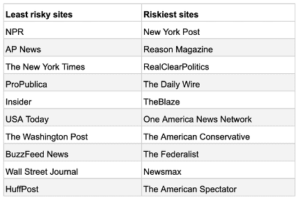
GDI is funded by organizations such as Open Society Foundations, chaired by George Soros; Reset, which believes “digital media today poisons the public sphere by amplifying division and distortion”; and the Bohemian Foundation, which offers grants to organizations committed to “diversity, equity, inclusion, and belonging.”
The Washington Examiner reported about GDI:
The Global Disinformation Index, a British group with two affiliated U.S. nonprofit groups sharing similar board members, is one entity shaping the ad world behind the scenes. GDI’s CEO is Clare Melford, former senior vice president for MTV Networks, and its executive director is Daniel Rogers, a tech advisory board member for Human Rights First, a left-leaning nonprofit group that says disinformation fuels “violent extremism and public health crises.”
For its recent report, GDI rated 69 news websites on the basis of “disinformation.” The group defines this as:
Adversarial narratives, which are intentionally misleading; financially or ideologically motivated; and/or, aimed at fostering long-term social, political or economic conflict; and which create a risk of harm by undermining trust in science or targeting at-risk individuals or institutions.”
But in its research, GDI calls anything that challenges the mainstream media narrative and offers legitimate debate about key issues “disinformation.”
Question election integrity? Disinformation. Question information about COVID-19, masks or vaccines? Disinformation. Question same-sex marriage or transgender ideology? Disinformation.
Here are just two examples of what GDI considers “disinformation.”
PJ Media reported on a study, from the British Journal of Sociology of Education, that showed “girls are often awarded more favorable grades than males with the same academic abilities.” This challenged the mainstream media narrative that says girls need more educational support to bring them up to “equity” with boys.
So, of course, GDI launched an attack on PJ Media, Google Ad Services, and BMW, which had advertised on the web page. GDI never bothered to engage with the article, the study, the truth about male-female differences, or how our educational methods have negatively affected boys. (See here, here and here, for what they called “disinformation.”)
Instead, GDI made a sweeping generalization and stamped the article with a pejorative label: “Disinformation: Misogyny.”
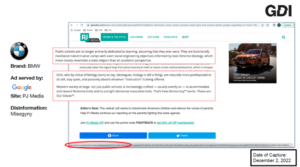
In another report, GDI went after a National Review article, Google Ad Service and Lenovo, for questioning “transgender” ideology and “gender-affirming” surgeries.
Again, these “disinformation experts” did not engage the arguments against gender ideology or the growing body of evidence that shows transgender medical procedures are harmful and do not help people. GDI just smeared the story with another sweeping generalization: “Disinformation: Anti-LGBTQ+.”
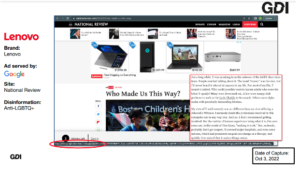
GDI doesn’t recognize that the real disinformation is telling small children they can turn into the opposite sex by changing their name, dressing differently, and spending thousands of dollars on dangerous drugs and surgeries.
Groups like GDI that push ad buyers away from conservative and Christian outlets have an effect. The Examiner quoted Mike Benz, the State Department’s ex-deputy assistant for internal communications and information policy. He said:
The implementation of ad revenue crushing sentinels like Newsguard, Global Disinformation Index, and the like has completely crippled the potential of alternative news sources to compete on an even economic playing field with approved media outlets like CNN and the New York Times.
The Federalist, one of the groups targeted by GDI, explained that it’s not just loss of advertising that’s harmful, it’s the threat of censorship to organizations that speak truth and expose the old media’s false narratives.
Margot Cleveland writes:
It is not conservative news outlets that are “risky,” however. And it isn’t even “disinformation” that’s risky: Disinformation – whatever that means – can be countered with the truth. What is risky is the growing belief that experts can both dictate what is deceptive and declare that such speech should be censored.
Related articles and resources:
How Good is Big Business at Respecting Free Speech, Freedom of Religion? ‘Abysmal’, Says New Report
‘The Twitter Files’ – Elon Musk Releases Details of New York Post Censorship
‘The Twitter Files Part Two’ – Documentation of ‘Twitter’s Secret Blacklists’
U.S. House Will Investigate the Federal Government’s Censorship of Conservatives

